

Kathryn Schulz: On being wrong. Tim Minchin on human logic. Money Can't Buy You Happiness, But a Little Respect Can. We're social animals.

Of course we care what other people think of us. It's hard-wired into our brains through natural selection. We want people to care because the more good connections with others, the more we roll with the pack, the better our chance of survival. At least, this is the way it was back in the day - and this is the way our brains still operate. It's possible for a person to live a totally isolated existence, to go the ol' hermit route - especially at this point in history - but not without repercussions. So in a sense, people truly need each other. I realize this is sort of a vague generalization, but overall it's true. Also: Money DOES buy happiness, but the happiness is usually short-lived. 7 Stupid Thinking Errors You Probably Make. The brain isn’t a flawless piece of machinery.
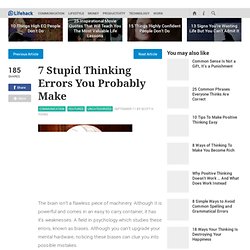
Although it is powerful and comes in an easy to carry container, it has it’s weaknesses. A field in psychology which studies these errors, known as biases. Outgrowing the Pain: A Book for and About Adults Abused As Children: Eliana Gil: 9780440500063: Amazon.com. Mature people truths. Emotional Skills Toolkit: Bring Your Life Into Balance. We often hear from people who feel overwhelmed by stress, family, work and relationship problems, health challenges, and painful emotions.
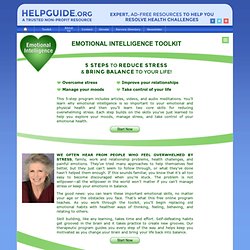
They’ve tried many approaches to help themselves feel better, but they just can’t seem to follow through, or what they’ve done hasn't helped them enough. If this sounds familiar, you know that it’s all too easy to become discouraged when you’re stuck. The problem is not willpower—all the willpower in the world won’t matter if you can’t manage stress or keep your emotions in balance. The good news: you can learn these important emotional skills, no matter your age or the obstacles you face.
How can I successfully identify and release my emotions? - emotions meditation emotional. How can I successfully identify and release my emotions?

I experienced a very controlled childhood during which I needed to suppress my emotions and wants in order to avoid conflict. As a result I find it difficult to identify emotions inside of myself and to find a satisfying way of releasing them. I've tried some techniques like sitting down with focused breathing and listening inward, but I often find the emotions to be too intense and I avoid doing it. It's not that I am incapable of feelings emotions, but that I have difficulty identifying exactly which emotion I'm feeling and why. I particularly feel scared of mixed emotions and try to avoid thinking about them without even realizing I'm doing it.
Emotions Are A Resource, Not A Crutch. Ever since Darwin, and perhaps long before him, it has been theorized that our emotions play a crucial role in adapting to our environment.
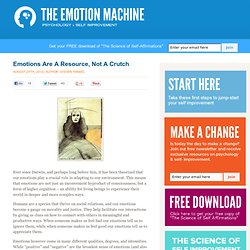
This means that emotions are not just an inconvenient byproduct of consciousness, but a form of higher cognition – an ability for living beings to experience their world in deeper and more complex ways. Humans are a species that thrive on social relations, and our emotions become a gauge on morality and justice. They help facilitate our interactions by giving us clues on how to connect with others in meaningful and productive ways. When someone makes us feel bad our emotions tell us to ignore them, while when someone makes us feel good our emotions tell us to appreciate them. Mind Over Mood: Change How You Feel by Changing the Way You Think (9780898621280): Dennis Greenberger, Christine Padesky.
Top 10 Thinking Traps Exposed. Our minds set up many traps for us. Unless we’re aware of them, these traps can seriously hinder our ability to think rationally, leading us to bad reasoning and making stupid decisions. Top 10 Common Faults In Human Thought. Humans The human mind is a wonderful thing.
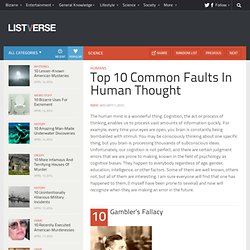
Cognition, the act or process of thinking, enables us to process vast amounts of information quickly. For example, every time your eyes are open, you brain is constantly being bombarded with stimuli. You may be consciously thinking about one specific thing, but you brain is processing thousands of subconscious ideas. 10 More Common Faults in Human Thought. Humans.

List of cognitive biases. Systematic patterns of deviation from norm or rationality in judgment Cognitive biases are systematic patterns of deviation from norm and/or rationality in judgment. They are often studied in psychology, sociology and behavioral economics.[1] Although the reality of most of these biases is confirmed by reproducible research,[2][3] there are often controversies about how to classify these biases or how to explain them.[4] Several theoretical causes are known for some cognitive biases, which provides a classification of biases by their common generative mechanism (such as noisy information-processing[5]).
Gerd Gigerenzer has criticized the framing of cognitive biases as errors in judgment, and favors interpreting them as arising from rational deviations from logical thought.[6] Explanations include information-processing rules (i.e., mental shortcuts), called heuristics, that the brain uses to produce decisions or judgments. Belief, decision-making and behavioral[edit] Social[edit] [edit] Michael Shermer on strange beliefs. Dan Gilbert on our mistaken expectations. What makes people feel pleasure?
Paul Bloom: The origins of pleasure Paul Bloom: Some pleasures seem easy to explain as a result of biologyHe says others depend on our thoughts about the value of what we're experiencingWine experts will rate a wine with a fancy label more highly than an ordinary oneThere is always more to pleasure than its physical aspect, Bloom says Editor's note: Paul Bloom is professor of psychology and cognitive science at Yale University, where he directs the Mind and Development Lab.
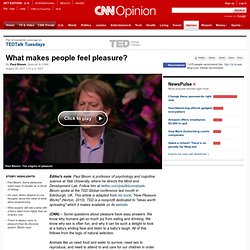
Follow him at twitter.com/paulbloomatyale. Bloom spoke at the TED Global conference last month in Edinburgh, UK. 15 Styles of Distorted Thinking. List of common misconceptions. From Wikipedia, the free encyclopedia This incomplete list is not intended to be exhaustive.

This list corrects erroneous beliefs that are currently widely held about notable topics. Ten Politically Incorrect Truths About Human Nature. Human nature is one of those things that everybody talks about but no one can define precisely.
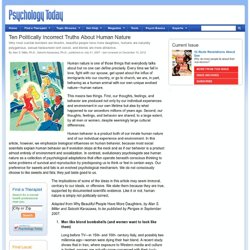
Every time we fall in love, fight with our spouse, get upset about the influx of immigrants into our country, or go to church, we are, in part, behaving as a human animal with our own unique evolved nature—human nature. This means two things. First, our thoughts, feelings, and behavior are produced not only by our individual experiences and environment in our own lifetime but also by what happened to our ancestors millions of years ago.
Second, our thoughts, feelings, and behavior are shared, to a large extent, by all men or women, despite seemingly large cultural differences. Eight (harsh) Truths That Will Improve Your Life... They say life is what we make of it. By the end of this post, I hope to have helped you decide whether that statement is true or not. There is no doubt that life has its ups and downs. What Doesn't Kill You Makes You Weaker. The Fear of Hurting the Other and the Inhibition of Self. Click here to contact Beverly and/or see her GoodTherapy.org Profile Even when it is unintended, some people find it intolerable to hurt someone they love. To experience hurting the other can create shame, guilt and strong “I am a bad person” feelings. As a result, we may avoid saying what is on our mind and put aside our own feelings and needs.
This inhibiting of the self can be harmful to our relationships and can create the conditions for developing anxiety and depression. Marlene, a 27 year old married woman, came into my therapy office feeling anxious and depressed. 30 Things to Stop Doing to Yourself. 5 Logical Fallacies That Make You Wrong More Than You Think.
The Internet has introduced a golden age of ill-informed arguments. 60 Popular Pieces of False Knowledge.